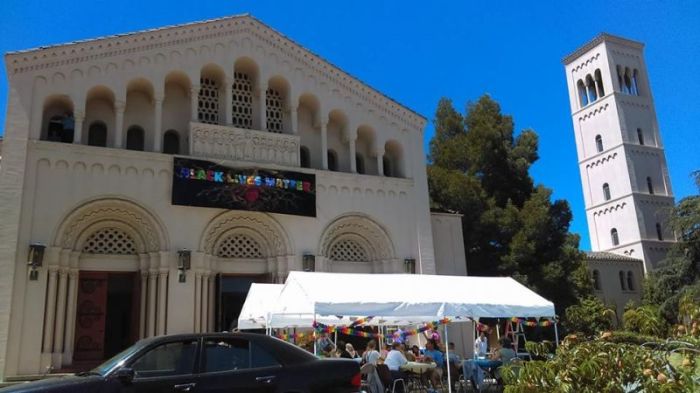Churches Pledge to Stop Calling Police, Citing Controversial Killings, Sexual Assault

Citing controversial extrajudicial killings and sexual assaults by police officers, a small group of California churches have made a drastic pledge to stop calling the police for help and utilize a more community-based crime fighting efforts.
"We are a church that has witnessed and experienced violence from policing systems. Members of our community have been surveilled, harassed, and sexually assaulted by law enforcement officers," Nichola Torbett, a lay leader at First Congregational Church of Oakland, said at a press conference last Wednesday.
"We feel like we can no longer tolerate the trauma inflicted on our communities by policing systems. Our love for one another and our faith call us to end our participation in systems that pit the safety of some of us against the safety of others of us," she added as she called the names of a number of individuals who have died at the hands of police, including Stephon Clarke who died after being shot multiple times in the back by Sacramento police officers last month.
First Congregational Church of Oakland which has been in existence since 1870 has been a Lay Led Congregation since December 2011 where the church has been without a paid pastor. The church has leaned instead on "the spiritual gifts of those within our communities — both within the congregation and beyond — to bring us the word during worship each week."
Torbett explained that the church is now working on a similar community-based model meet the security needs of the diverse congregation.
"We honor the memory of all who have been killed by state violence by declaring our intention to reduce reliance on policing and incarceration and develop community-based safety and conflict resolution initiatives. We are not anti-police but pro-community. We invest in human beings and in relationship while we divest from systems that harm human beings and relationship," she said.
An earlier report in The Washington Post on the push among churches to stop calling the police said it is being organized by a nationwide organization called Showing Up for Racial Justice, which seeks to get white Americans to promote racial justice.
So far, the group only includes four Unitarian and Protestant churches in California. The Northern California Nevada Conference of the United Church of Christ has committed to recruit churches to join the movement while others are looking for help from the Disciples of Christ and the Presbyterian Church (USA), but it has been a tough sell.
"It's a challenging ask," the Rev. Anne Dunlap, a United Church of Christ minister who leads SURJ's outreach to faith communities told The Washington Post. "It's a big ask to invite us, as white folks, to think differently about what safety means. Who do we rely on? What is safe? For whom? Should our safety be predicated on violence for other communities? And if not, what do we do if we're confronted with a situation, because we are, as congregations? ... How do we handle it if there's a burglary? How do we handle it if there's a situation of violence or abuse in the congregation?"
Many churches approached by SURJ about the initiative have been reluctant to join the movement because, Dunlap said, they are concerned about creating more problems than solutions.
"I had some hard conversations with pastors and members," Dunlap told The Washington Post. "These were progressive congregations that had participated in our work in the past — hung Black Lives Matter banners and had them vandalized. They said, 'We appreciate our relationship with the police. We don't want to put that at risk.'"
She believes however that police reform will not get rid of police violence and the only solution is to "dismantle policing as a system."
While individual church members can call the police for their personal security concerns, churches in the movement believe they can create a security system in which neighbors form relationships and create systems to defend their own communities.
This approach to security, according to Chuck Wexler, executive director of the Police Executive Research Forum, which conducts studies on improving policing, could expose churches to danger.
While there are certainly some tasks churches can handle on their own, such as dealing with an unruly drunk, Wexler told The Washington Post that churches can use their moral influence to make police departments better.
"I understand where these folks may be coming from. They're saying we have issues. But if you have issues, you shouldn't cut yourself off from such an important institution in the community. Communities only have one police force. If they're not doing what you want them to do, you should be engaged with them," he said.
"It's disappointing to hear when a community or religious organization decides they're not going to engage with the police anymore. Police need the church. They need an active clergy. They rely on them," he added.




























